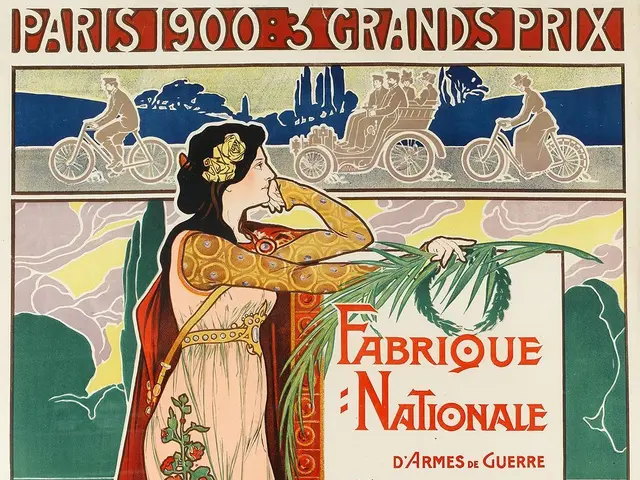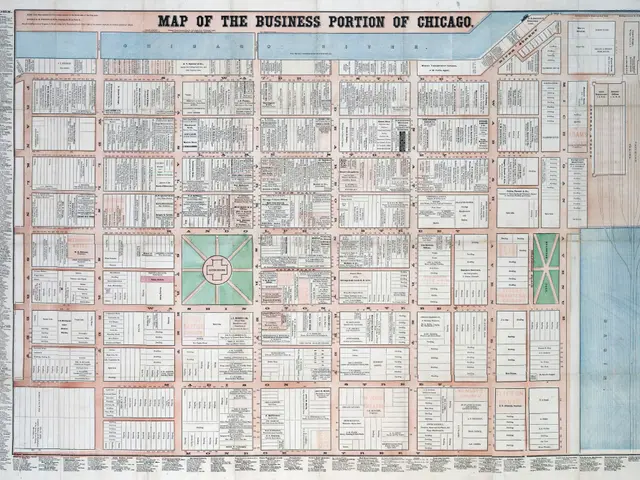Opposition in Venezuela Pursues Pragmatic Approach for Upcoming Presidential Vote
In a turn of events, controversial far-right figure María Corina Machado, who was barred from running in the 2024 presidential race by Venezuela's Supreme Court, made an attention-grabbing declaration: "There will be no elections without me!"
This assertion, dripping with defiance, stirred concerns of disorder, especially as US officials backed her stance, warning that refusing to allow Machado's candidacy could lead to a re-imposition of sanctions in April. To emphasize its resolve, Washington swiftly revoked a previously approved license granted to the Venezuelan state-owned mining company Minerven, enabling international gold trading.
However, political developments in Venezuela show a promising path toward a sixth presidential election since the enactment of the 1999 Constitution. The heated debate over Machado's disqualification seems to be losing steam, with most opposition factions backing the move to focus on presenting viable alternatives as the electoral timeline is being established through an unprecedented national consultation.
A notable shift can be seen in the National Assembly (AN), predominantly controlled by Chavismo, initiating a dialogue process with various national sectors to craft and submit a unified proposal to the National Electoral Council (CNE) regarding the electoral schedule. Over forty political parties and movements engaged in these discussions, offering dates and providing constructive feedback on the upcoming vote. By the end of these talks, a total of 25 potential electoral dates were under consideration.
At first glance, anyone reading the headlines might assume that Machado's bold statement has a strong foundation, which could potentially disrupt the electoral process. Yet, in reality, a closer look reveals a different story.
Machado emerged victorious in internal primaries where a portion of the political spectrum opposed to the Maduro government participated. However, she is far from being the figure who can unify the opposition, despite the media glossing over her flaws.
Disqualified by the Comptroller General's Office and upheld by the Supreme Court, Machado faces significant opposition within the opposition spectrum. Her leadership style, perceived as overly personal and tied to her privileged social background and us support, is met with strong resistance. Despite her lengthy political career, she has failed to gain the popularity her propaganda team claims. The protests she organized after her political ban were a resounding failure, dissolving swiftly.
Additionally, the internal elections she won are marred by skepticism, not just within the government's sphere but also among anti-Chavista factions. Several opposition parties opted out of participating in those primaries, which were met with early criticisms from those who did partake.
Doubts surround the high percentage of votes she received and the large turnout reported. The primary commission declared her the winner with over 90% of the votes and reported a 2.3 million turnout, but these figures are clouded in controversy.
Machado's extreme political stance, reminiscent of Argentina's Javier Milei, does not enjoy the backing presumed. Her calls to "eradicate socialism" and "hold current regime leaders accountable" suggest that a potential presidency of hers would be filled with internal strife and conflict. Surveys on the sociopolitical landscape indicate that the majority desires peace, stability, and prosperity, especially following years of economic challenges, conflicts, blockades, sanctions, and foreign meddling.
From disqualification to legal barring
Machado's victory in the primaries was surprising, given her well-known ineligibility to hold public office. The National Primaries Commission, led by renowned lawyer Jesús María Casal, overlooked her ineligibility and ultimately declared her the winner.
The primary election was organized by the Unitary Platform, a fragile coalition consisting of factions from Acción Democrática, the far-right party Primero Justicia, Un Nuevo Tiempo (a social democratic group that split from AD years ago), and Voluntad Popular (a far-right party associated with Leopoldo López and Juan Guaidó). Despite awareness that Machado could not be officially registered as a presidential candidate due to her disqualification, these parties did not question her participation as the candidate representing Vente Venezuela, her own political organization.
In December 2023, as part of the Barbados Agreements brokered by the government and the US-backed opposition, a mechanism to review the disqualifications of political leaders was established. This process required the affected individuals to submit a formal request for reconsideration of their cases to the Constitutional Chamber of the Supreme Court, with a commitment from all parties to abide by the court's ruling.
Initially, Machado refused to challenge her disqualification, calling it nonexistent and, therefore, appealing it would be contradictory. However, on the day of the deadline for filing the complaint, she appeared before the highest court and presented her case. It was striking that this change of opinion was announced not by herself, but by the US "ambassador" for Venezuela, Francisco Palmieri, based in Bogotá, as diplomatic relations between Venezuela and the US are broken. It was then interpreted that the government of Joe Biden had "suggested" that Machado appear before the Supreme Court.
In January, the Constitutional Chamber issued its ruling, upholding Machado's disqualification. The high court justified its decision by pointing out several infractions committed by the politician, including the pivotal action that led to her initial sanction: accepting a role as an alternate representative of Panama to the OAS while holding a seat in the National Assembly. This occurred in 2014, during Ricardo Martinelli's administration, and was orchestrated by the OAS Secretary-General, Luis Almagro, to provide a platform for the radical Venezuelan opposition to undermine the legitimate Maduro government in the body's General Assembly.
Furthermore, Machado stands accused of advocating for economic sanctions and foreign military intervention in Venezuela, as well as actively participating in the questionable interim government of Juan Guaidó. These actions, it is alleged, facilitated the illicit control of Venezuelan assets abroad, such as CITGO and Monómeros, the unauthorized seizure of 31 tons of Venezuelan gold in the United Kingdom, and the freezing of US $4 billion in international bank deposits through imposed sanctions.
With this final ruling, Machado's disqualification, initially an administrative measure, transformed into an irreversible judicial verdict. "It is res judicata," government spokespeople have said when faced with demands from the US government and allies to overturn the sentence.
As the spotlight dims on Machado, the search for alternative presidential candidates intensifies. The National Assembly's dialogue sessions have revealed a shared commitment among a diverse range of opposition forces to participate in the upcoming presidential elections, temporarily setting aside discussions surrounding Machado's disqualification.
Names like Luis Eduardo Martínez, Javier Bertucci, José Brito, Benjamín Rausseo, Juan Carlos Alvarado, Antonio Ecarri, Luis Ratti, Seir Contreras, Manuel Isidro Molina, María Alejandra Díaz, Manuel Rosales, and Eduardo Fernández have emerged as potential contenders for the 2024 race.
In various circles, there is speculation about the possibility of Machado delegating the candidacy to someone else, acting as a figurehead. Names such as lawyer Gerardo Blyde and Magalli Meda, Machado's personal assistant and campaign manager, possibly unknown to the general public, have been suggested as candidates.
Clodovaldo Hernández is a journalist and political analyst with experience in higher education. He won the National Journalism Prize (Opinion category) in 2002. He is the author of the books Reinventario (poetry and short stories) De genios y de figuras (journalistic profiles) and Esa larga, infinita distancia (novel).
The views expressed in this article are the author's own and do not necessarily reflect those of the Venezuelanalysis editorial staff.
Translated by Venezuelanalysis.
- In a surprise victory, Maria Corina Machado, despite her ineligibility to hold public office, emerged as the candidate for the Unitary Platform's primary election.
- The National Primaries Commission, led by Jesus Maria Casal, overlooked Machado's ineligibility, a decision that later led to controversy.
- The high court's ruling, issued in January, upheld Machado's disqualification, citing several infractions, including her role as an alternate representative for Panama to the OAS while serving in the National Assembly.
- With Machado's disqualification confirmed, the focus has shifted towards finding alternative presidential candidates for the 2024 race.
- Names like Luis Eduardo Martinez, Javier Bertucci, Jose Brito, and Manuel Rosales have emerged as potential contenders, while there is speculation about Maria Corina Machado delegating the candidacy to someone else.
- The future of Venezuela's political landscape is being shaped by policy-and-legislation, conflicts, and the decisions of US officials, creating a tense atmosphere of war-and-conflicts.
- The National Assembly's dialogue sessions have revealed a commitment among opposition forces to participate in the upcoming presidential elections, temporarily setting aside discussions on Machado's disqualification.
- As Venezuela moves towards its sixth presidential election since the 1999 Constitution, the impact of regular car-accidents, fires, sports, sports-betting, crime-and-justice, general-news, and migration on the election remains to be seen.









